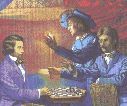Chess Books - Instruction
Duke of Brunswick reviews...
The Chess Advantage in Black and White By Larry Kaufman Opening repertoire books have become the staple diet of chess publishing houses. Typically, you will be told how to play a play a particular opening, what will cause your opponent the most difficulties and how to get the maximum results with the minimum effort. Armed with this knowledge you can expect to sweep away the hapless opposition in the next club match. But all too often, it doesn't happen this way.
|
more reviews ...
Improve Your Chess in 7 Days An up the minute and chatty book by the well known player and chess trainer Gary Lane. This is not a book that has been churned out using chessbase and reams of computer analysis. It's more like a traning session ... Lane writes in a very light easy and conversational way. But make no mistake, these are lessons from a chess heavyweight and you are getting expert advice |
Devious Chess: How to Bend the Rules and Win Amatzia Avni is an Israeli psychologist. He is a FIDE master over-the-board and in composition, a former editor of the Israeli chess magazine, Schahmat and a regular contributor to Chess Monthly. He has written a number of books on chess psychology, including Practical Chess Psychology . Read Full Review ...
|
Logical Chess Move by Move (Paperback) 216 pages, Publisher: B.T. Batsford Ltd , Language English ISBN: 0713484640 This is a chess classic in which 33 games are analysed in minute detail move by move. This means that even the first move is expained every time! Yes, e4 and d4 are explained several times.! To give you some idea of the variation in annotation one of the d4 explainations lasts half a page, othertimes you get bullet points, other times just a quick sentence. But every move of every game is always explained. This may seem like overkill but I think it works a treat. Read Full Review ... |
Chess: The Complete Self-Tutor (Batsford Chess Book) (Paperback) by Edward Lasker Paperback: 368 pages ISBN: 0713481609 This is hypertext 1970's style no computer in sight! Here's how it works . the book is divided into numbered "sections" of a couple of paragraphs each. They all teach some aspect of the game working from very basics suitable for an absolute beginner, very quickly moving to very challenging questions suitable for any standard of player. Read Full Review ... |
The art of planning in Chess - by Neil McDonald, London 2007. 284 p.p. £15.99 This is a book that explains the difference between tactical analysis and planning. McDonald explains the difference ... Tactics will tell you that you can put your knight on splendid square while planning is about deciding whether it is going to be any use on that square. You might decide "great the knight will help support the other pieces queen the passed pawn." - That's planning, rather than just putting a piece on a great square and admiring it! Read Full Review ... |
Bobby Fischer : His Approach to Chess – Agur While not a grandmaster himself, Elie Agur has obviously made a deep study of Bobby Fischer's games. In this fascinating and highly instructive book, he analyses the elements of Fischer's style with reference to specific games. As Agur says, ""Besides being a study on Fischer, it is a treatise on the middlegame at large"". Over 300 diagram positions are taken apart, with a page or more sometimes devoted to a single move, its implications and alternatives. Topics include pawn structure, piece placement, material, timing, strategy (e.g. plans, seizing the initiative, liquidation, and playing for space), clarity, straightforwardness, alertness, reducing the opponent's options, playing to win, practical chances, tactics, technical aspects and overall vision. Fischer's weaknesses are not allowed to pass unmentioned, either. Agur devotes whole chapters to superficiality, misplaying won positions, and typical blunders and oversights. You can learn all sorts of fascinating details about the great man and his opponents. For instance, Fischer's decision to play Alekhine's Defence against Ciocaltea in the 1965 Capablanca Memorial tournament amazed fans. Agur explains what really happened. Fischer was participating by cable, as the State Department denied him a visa to go to Fidel Castro's Cuba in the aftermath of the 1962 missile crisis. Ciocaltea's first move was received as 1. d4 and so played on the board, and Fischer replied 1...Nf6 as usual. Only when the second move, 2. e5 came through was the mistake discovered. Characteristically, Fischer refused to change his first move and achieved a hard-fought draw after a long struggle against an opponent he would often have expected to beat. Buy from www.chess.co.uk |

